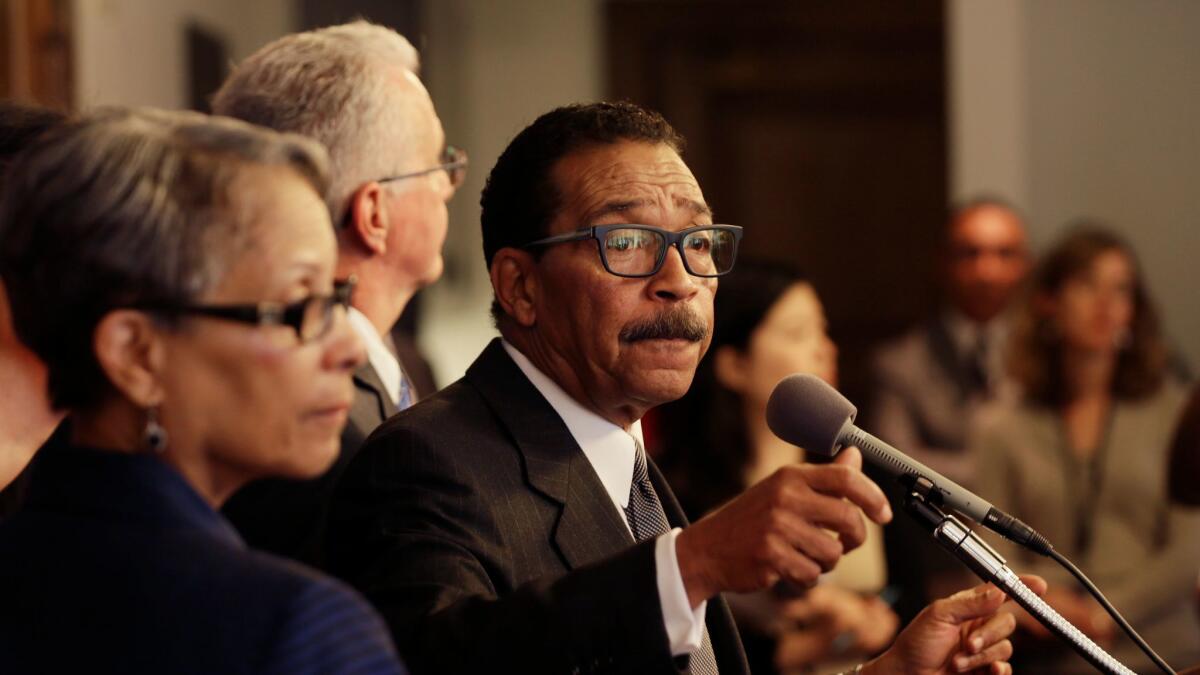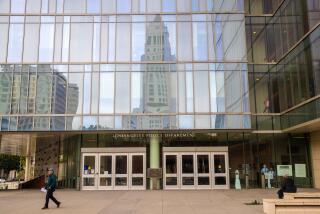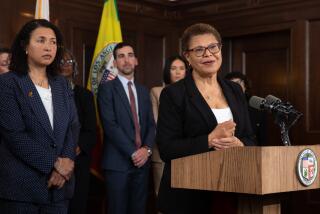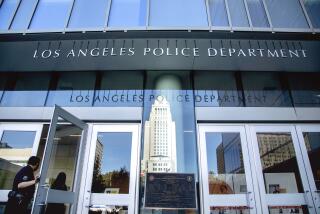L.A. council members call for closer look at LAPD’s often-criticized disciplinary system

As City Hall pushes a proposal that could give civilians a greater role in disciplining Los Angeles police officers, city lawmakers on Friday called for a closer examination of the police department’s often-criticized disciplinary system that could open the door to further changes.
City Council President Herb Wesson introduced a motion calling for a series of reports and community meetings about the L.A. Police Department’s Board of Rights panels, noting that procedures haven’t been “thoroughly reviewed and evaluated” in more than two decades.
If approved by the council, Wesson’s motion would also direct city agencies to explore how to expand the pool of civilians hired to weigh discipline cases and ways to increase transparency surrounding the proceedings, which are kept secret under state law.
Vanessa Rodriguez, a spokeswoman for Wesson, said he introduced the new motion to ensure that the proposal already on the table — which could give civilians a greater role in disciplining officers — “wasn’t done in a vacuum.”
“It has to be an ongoing conversation,” she said. “Depending on what he hears from the community in these various town hall forums, I think that will facilitate the city’s next steps.”
The move comes days before the City Council is poised to vote on language for a May ballot measure that, if passed by voters, would allow officers facing serious discipline to have their cases heard by an all-civilian board. Under the current system, Board of Rights panels are made up of two high-ranking officers and only one civilian.
If Wesson’s motion is approved in committee Monday, the council could vote on the two motions a day later. Mayor Eric Garcetti has expressed support for both.
Offering all-civilian boards would mark perhaps the most significant change to the LAPD’s disciplinary system in decades — one that has long been sought by the union representing rank-and-file officers.
But the proposal has drawn criticism from some community groups and LAPD observers, who argued that the department’s disciplinary system needed a larger overhaul with more public input.
On Thursday, four groups — the Community Coalition, the American Civil Liberties Union, Los Angeles Community Action Network and the L.A. branch of the Black Lives Matter movement — urged Wesson and Garcetti to scrap the proposed ballot initiative.
Those affiliated with the coalition argued that qualifications for the civilians who sit on the disciplinary boards unfairly exclude the vast majority of Angelenos. Some accused the union of looking for softer punishments for cops, pointing to a city analysis that showed the civilian members were “consistently more lenient” than their sworn counterparts and frequently voted to acquit the accused officers or dole out lesser punishments.
“This isn’t real civilian oversight,” said Peter Bibring, a senior staff attorney for the ACLU of Southern California. “This is just going to make it harder for officers to be disciplined for misconduct and harder to hold anybody accountable for that failure.”
LAPD Chief Charlie Beck has also raised concerns about the potential for all-civilian disciplinary panels. He recently told reporters that although he was “more than willing” to find ways to improve the disciplinary process, he thought removing sworn officers from the hearings would also take away valuable insight into the LAPD’s procedures and expectations for officers.
“It’s an old system,” Beck said. “I think it needs a lot of discussion before we do anything. There is much at risk.”
Under the current system, Beck must send any officer he wants to fire to a Board of Rights hearing. If the panel determines the officer is guilty of the accusations, it then recommends whether to fire the officer or assign a lesser penalty, such as a suspension. The chief can accept or reduce the punishment, but not increase its severity.
Officials with the union representing about 9,800 rank-and-file LAPD officers contend that the boards can be unfairly swayed by favoritism within the department — or by the chief’s influence over the two officers who sit on each panel. Civilians can look at the cases more objectively, they argue, without pressure from the police chief.
Wesson’s latest proposal acknowledged the complaints about the LAPD’s disciplinary system from inside and outside the department. It also noted a recent surge in lawsuits settled by the city, including some stemming from police officers’ actions.
The City Council moved this week to issue a bond borrowing up to $70 million to help pay off mounting legal settlements and court judgment costs. Last month, the city agreed to pay $8 million to end lawsuits related to three fatal shootings by LAPD officers.
“Repairing the disciplinary system can be a significant factor in increasing the trust between the public and the city,” Wesson’s motion read. “That increased trust can and should lead to a reduced number of jury awards and settlement payouts.”
Karren Lane, vice president of policy for the South L.A.-based Community Coalition, said that her organization was encouraged by the motion introduced Friday and the community input it called for. But, she said, council members should table further action on the proposed ballot measure until they get more information.
“There’s a lot of questions that need to be answered,” she said. “But then the City Council is considering supporting a ballot measure to change our City Charter without answering those questions.”
Times staff writers Dakota Smith and David Zahniser contributed to this report.
MORE LOCAL NEWS
Residents meet to discuss ongoing concerns, including ‘deaf ears’ at City Council meetings
Glendale City Councilman elected to transportation boards
More to Read
Start your day right
Sign up for Essential California for news, features and recommendations from the L.A. Times and beyond in your inbox six days a week.
You may occasionally receive promotional content from the Los Angeles Times.







